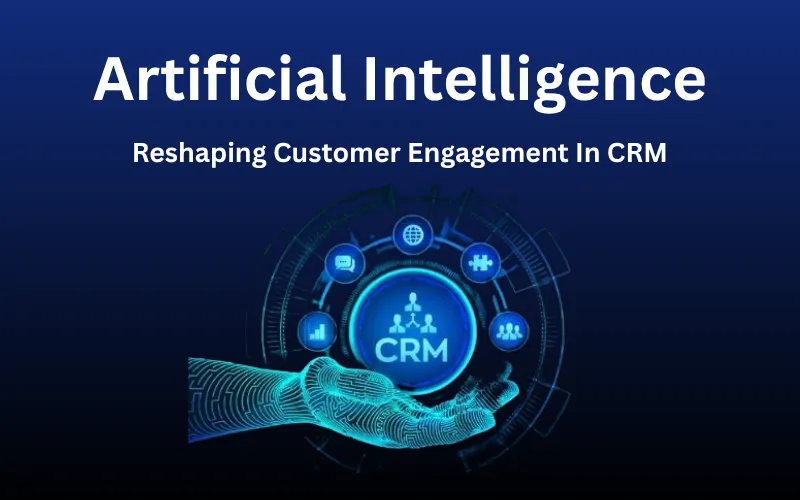The skill of personalized engagement is no longer just a bonus, but a necessity. But in today’s data-driven world and customer-centric approaches, it becomes difficult to manage all of this. And think of it on a large scale without degrading quality or efficiency. Seems Impossible!! However, there is now a way out. That is the union of AI in CRM. This innovative crossover is reshaping how businesses interact with their customers through artificial intelligence customer engagement. They offer unmatched levels of customization.
This blog will shed some light on the revolutionary impact of an AI-driven CRM. We will dig deep into the way these technologies are changing customer engagement. Furthermore, we will see their use cases and the future scope.
Effective Ways AI is Transforming CRM & Customer Relationships
AI in CRM is effectively changing businesses, automating workflows, customizing client interactions and predicting sales with pinpoint accuracy. Companies utilizing AI and ML services gain a competitive edge that boosts efficiency, revenue, and retention. The future belongs to those who grasp fast and make data-driven decisions.
Smart CRM Approaches:
- CRM’s role has advanced, as AI is now able to take our data and put it to action. It frees sales teams from entering data since it can predict what customers will do and highlight chances that require attention.
Better Ways for People to Engage with a Company:
- AI customer engagement tools like chatbots and virtual assistants give you quick and personal support. Thanks to understanding context, sentiment, and intent, customer service gets better, whether handled by a person or in self-service.
Live Updates & Future Outlook:
- AI in CRM shows current outcomes and predicts what’s next, assisting businesses in responding early to possible issues and new opportunities.
Being precise in Sales & Marketing:
- With AI, the customer is offered the correct kind of message. Marketers can predict more accurately, improve the way leads are evaluated, and run personalized campaigns even for large groups of people.
Managing and Securing Data:
- The AI technology handles cleaning, segmenting, and securing customer details. It is accurate and capable of finding any security threats the moment they happen.
Personalized Shopping Process:
- Artificial intelligence customer engagement means understanding customer needs before they even express them. This offers relevant recommendations and timely follow-ups to boost loyalty.
Workflow Automation:
- Tasks such as data entry, following up, and scheduling that require repetition can be done automatically by machines.
Revenue Growth:
- AI helps find good leads, proposes more products, and improves every step of the sales process.
AI Fits any CRM Platform:
- Any industry or business, big or small, can use tools from Salesforce Einstein, HubSpot, and Zoho.
Greater Assistance for Customers:
- With instant answers, smart allocation of cases, and immediate help for agents, it delivers a seamless AI customer engagement experience.
Artificial Intelligence in CRM Use Cases
The use cases for AI in CRM are huge and change depending on the various goals of the business. Some important ones are:
Business intelligence:
- AI helps businesses by offering them different strategies for sales, marketing, and customer service. AI lets businesses analyze customer data, which helps them identify what customers require and decide on proper long-term actions.
Customer service:
- Including AI tools in a company’s customer service strategy can ensure prompt and correct feedback to questions. Chatbots supported by AI make it possible for businesses to help customers day and night.
Data management:
- With AI, CRM systems manage customer information efficiently by handling tasks such as data input and making it accurate and refined. Besides, having accurate data is important for all the AI activities in the business, and an AI-powered CRM can keep all data correct.
IT efficiency:
- Routine tasks can be made simpler in CRM systems since AI along with automation, can handle them automatically. IT departments can let AI manage simple tasks, for example, assigning tickets and solving some basic problems.
Marketing personalization:
- CRM systems with AI can make marketing materials relevant to particular individuals and separate customers using their purchase history and how much they engage.
Lead management:
- AI-based lead scoring makes it possible for the business to instantly rate and qualify leads in its CRM tool. Also, using machine learning, more can be discovered about leads and how they behave, which enhances the way businesses reach out to them.
Predictive customer analytics:
- Broadly speaking, AI’s data abilities are far-reaching and this is especially clear in customer analytics as part of CRM. Through AI, businesses may examine customer data in the past and forecast what the customer might do or require.
Process optimization:
- When AI enters a CRM system for a process, it helps make the process more effective by identifying problems that may not have come to light otherwise. AI is useful for studying current activities in the company and highlighting any delays that occur.
Sales optimization:
- Businesses employ AI technology in CRM sales to find leads and then target the most valuable clients based on predictions. The automated workflows smooth sales processes, while the predictive analytics assist in forecasting customer behavior.
- An AI-powered sales agent can further streamline this by automatically engaging prospects, answering queries, and guiding them through the sales funnel—reducing manual effort and accelerating deal closures.




